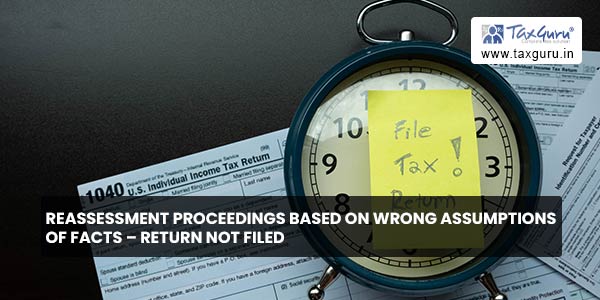1. The “reasons to believe” in an income escaping assessment (section 148 read with section 147 of the Act) is one of the most important piece of document. It is the foundation stone with respect to the validity of the entire reassessment proceedings. “Reason to believe” is the document which requires careful consideration and it cannot be overlooked as a mere formality by the Assessing Officer (AO).
2. It is a trite law that reassessment proceedings cannot be initiated on the basis of wrong assumptions of facts. There are plethora of rulings wherein it has been held that the reassessment proceedings, that were initiated on the basis of wrong facts and presumptions of the AO, cannot be considered as valid and legal. For this, we can refer to the rulings in the case of Ankita A. Choksey v. ITO in writ petition no. 3344 of 2018 dated 10.01.2019 (Bombay HC), Khem Singh Sankhla v Union of India [2003] 133 Taxman 767 (Rajasthan HC), Tata Sons Ltd. v. DCIT writ petition no. 2545 of 2010 dated 09.02.2022 (Bombay HC), etc.
3. In all the aforesaid cases, it has been held that the wrong presumption of facts at the time of recording the reasons to believe would put a question mark on the sustainability of the entire proceedings. Considering this, in some peculiar cases, it has been noticed that the AO while recording the reasons to believe has presumed that the assessee has not filed a return of income and accordingly, has made up a case of income escaping assessment. However, in actuality, the assessee had duly filed a return of income. Whether these cases would be considered as a case of wrong assumption of facts and would these cases deserve to be quashed? The answer is yes.

4. In this regard, it is relevant to refer to the ruling of Gujarat High Court in the case of Sagar Enterprises v. Assistant Commissioner of Income Tax [2002] 257 ITR 335 (Gujarat HC). In this case, the AO while forming the “reasons to believe” mentioned that since the assessee has not filed his return of income for the subject assessment year, as per Explanation 2(a) to section 147 of the Act, it should be deemed to be a case where income chargeable to tax had escaped assessment. When the matter came up for hearing before the Hon’ble High Court, the assessee furnished the copy of return of income, acknowledgement, etc. before the court taking a plea that it had actually filed a valid return of income and therefore, there is a wrong presumption of fact on the part of the AO. The High court after looking into the facts of the case and after going through the reasons recorded by the Ld. AO held that it is apparent that the factor of non-filing of return has weighed overbearingly for the AO while recording his satisfaction for initiating the proceedings against the assessee. Once it is shown that an irrelevant/incorrect fact has been taken into consideration while forming the reasons, on this count alone the petition of the assessee deserves to be accepted and the notice issued deserves to be quashed and set aside.
5. Another ruling which follows the principle laid down by the Gujarat High Court is ITAT, Jaipur bench’s ruling in the case of Narain Dutt Sharma v. ITO [2018] 91 taxmann.com 463 (Jaipur – Trib.) wherein on similar facts the ITAT provided relief to the assessee and quashed the reassessment proceedings. In this case, the AO at the time of recording reasons for reopening the assessment mentioned that amount deposited in the bank could not be verified because assessee had failed to file a return of income for the relevant year as same was not reflected in the IT system of Department. Against this contention, the assessee raised a plea before the ITAT that it had filed a return for the relevant year and provided evidence for the same. After hearing both the parties, ITAT held as follows –
“It is therefore clear that the whole foundation of the Revenue’s reasoning is contradictory and self-defeating where at the time of issuance of notice u/s. 148, it says that the assessee has failed to file his return of income and subsequently, during the proceedings u/s. 147, it admits that the assessee has filed his return of income originally under section 139. On this ground itself, the assumption of jurisdiction u/s. 147 cannot be sustained and the subject proceedings are liable to be quashed. (Para 14 of the ruling)”
6. Although, the law with respect to the reassessment proceedings has been substituted with an entirely new scheme, the relevance of the above discussion is still in existence (i.e. for the notices issued under the old scheme for earlier years).
7. Therefore, it is important to look into the facts/documents/reasons to believe properly before dealing and proceeding with the notices issued by the revenue under section 148.
*******
(Deepak Pareek is the author of this article. If in case of any query (notice under section 148, 143, or any other tax query) he may be contacted at deepak.pareek91@gmail.com or at +91-9680675119)





